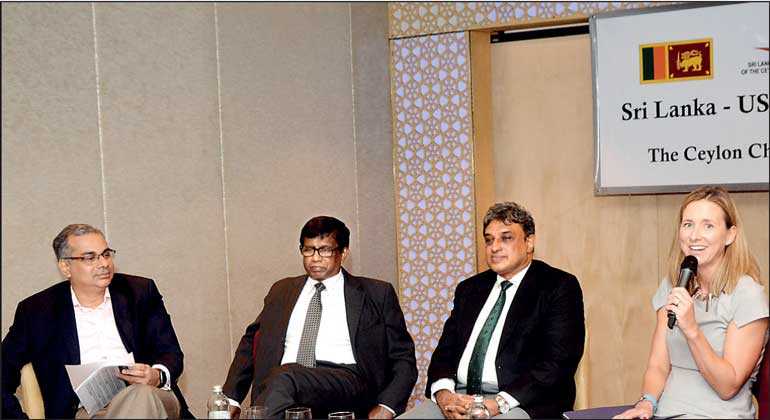Friday Feb 20, 2026
Friday Feb 20, 2026
Friday, 30 August 2019 00:30 - - {{hitsCtrl.values.hits}}

By Charumini de Silva
A top US official yesterday expressed the hope that Sri Lanka will eventually approve the $ 480 million grant-led Millennium Challenge Corporation (MCC) Compact program, and the American aid agency will also consider extended time for finalisation as a special case. “Our Board meets quarterly and the next meeting is on 18 September. They will talk about Sri Lanka and try to understand why we have has some challenges in getting the program approved by the Cabinet in a timely manner.
We hope that our Board will give us some additional time recognizing the current pre-election environment that we have here and that politics that play. But we just don’t know how they will respond,” MCC Sri Lanka Resident Country Director Jenner Edelman told a forum yesterday.
Speaking at the ‘Understanding the MCC Compact’ forum organised by the Sri Lanka-US Business Council of the Ceylon Chamber of Commerce, she pointed out that the window to get off the compact was narrowing down, as Sri Lanka graduated to an upper-middle income status in July.
“This grant was agreed a long time ago. We very much want to honour this partnership with Sri Lanka and move ahead,” she added.
It was noted that MCC generally partners with low and lower-middle income countries. MCC Sri Lanka Compact is the largest grant funding ever committed to Sri Lanka. The Government and MCC together identified weak transport infrastructure and weak land administration practices as two binding constraints to economic growth in Sri Lanka.
President Maithripala Sirisena this week deferred Cabinet approval for the MCC Compact, given some concerns over some of the areas covered in the program, and urged not to hasten signing as the country is in the midst of an election cycle.
Considering the misconceptions around the program, Edelman said they were now trying to engage with the public to explain the Compact, while categorically stressing that they are not forcing it on Sri Lanka.
“We want to see this program go forward for the people of Sri Lanka. It is your program. It is up to the Sri Lankan people and the Government of Sri Lanka whether to accept this grant or not,” Edelman pointed out.
Of the total $480 million grant, $350 million is for the transport infrastructure project while $67 million is dedicated to the land administration project. Together, the two projects are expected to benefit 11.3 million people, which accounts for 54% of Sri Lanka’s population.
The transport infrastructure project receiving a $ 350 million grant has three components:
An advanced traffic management system ($160 million) which will: optimise efficiency of 205 km of urban road networks; offer technology for vehicle detection and real time analysis of traffic flow data; set up an interconnected traffic signal system; establish bus priority systems across the network; carry out civil works improvements to 132 junctions in Greater Colombo; expand pedestrian crossings; and improve sidewalks
Bus service modernisation ($50 million) will: introduce automated fare collection systems(smart cards); single schedules for bus operators on given route; enable schedule efficiency through GPS bus tracking; establish improved accessibility and safety for women, seniors, disabled people; provide assistance to SLTB and private bus operators to develop financing arrangements to purchase state-of-the-art buses
Rural transport activity ($140 million) will upgrade 131 km inter-provincial road network in Uva, Sabaragamuwa, and Central Provinces; connect economically-lagging central region with ports and markets in the Western Province; strengthen capacity for road maintenance; develop new financing mechanisms for road maintenance fund and introduce road safety measures
The land administration project ($67 million) covers 8 districts in Sri Lanka and will: assist the Government to map and survey State lands and enter data in the Government’s e-State Lands Information Management System; strengthen the Government’s capacity to accurately assess State and private lands; carry out research in support of measures to improve land administration policies; improve tenure security for all land holders by assisting the Government to move properties from the Deeds system to the Title Registration system through the Government’s BimSaviya program.
